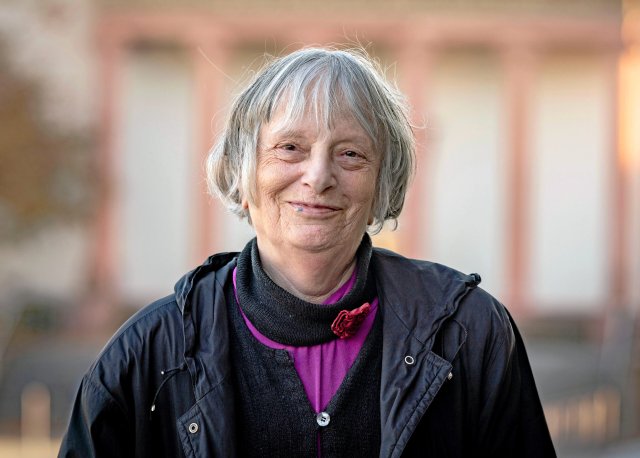Elke Erb 2020 before the Büchner Prize was awarded in Darmstadt
Photo: Frank Rumpenhorst
Anyone who makes sense of something doesn’t want to understand anything. Art tricks, showmanship with language, coddling exquisite words, that wasn’t Elke Erb’s thing… Even if she by no means disdained the rhyme itself. Her poetry – there are no stories, novels or dramas from her, although there was a lot of prose from diaries – was a blunt but tentative, precise but never opinionated way of perceiving the world in sentences.
Such a pseudo-definition is horribly abstract. You couldn’t accuse her of any school of poetry, even though Elke Erb was often in company and several generations of writers could not only admire her, but also converse well and thoroughly with her – until her memory became weak a few years ago. The prerequisite was that you didn’t babble on about any gross self-evident things.
Experiencing what is written on paper is what it was all about. Reading and writing have an ethic. If you follow the gestures of a text and understand it as a body, it is possible to experience a linguistic event without plot or characters in such a way that you realize for yourself what kind of guy the text is.
Elke Erb was born in Scherbach in the Rhineland in 1938. Her father, a literary scholar and a communist after being a prisoner of war, who was actually supposed to become a pastor, brought her and her sisters to Halle an der Saale, where they lived for a while in the Francke Foundations. Not an idyll. After completing her service as a farm worker, she studied to become a teacher in German and Russian.
The great Austrian poet Friederike Mayröcker, with whom she was sometimes absurdly compared, lost her voice in school. Elke Erb only taught for a short time and became an editor at Mitteldeutscher Verlag, but this use of language and this position led to a nervous breakdown. Farm work again in the Altmark, then she became a freelance writer. And translated from Russian, for example Marina Tsvetaeva or later Oleg Yuryev.
She lived in East Berlin with her husband Adolf Endler, himself a poet and father of her son Konrad. In Prenzlauer Berg people met, for example in Ekkehard Maaß’s living room, and read to each other, discussed, argued, ate and drank. Bert Papenfuß was there, Uwe Kolbe, Peter Brasch, Sascha Anderson. People learned from each other without peer pressure and uniform poetics.
The Stasi became aware of her because of an unpleasant East-West anthology; Elke Erb was not excluded from the writers’ association. Recognition came from both FRG and GDR. In 1988, for example, she was awarded the SWR’s Peter Huchel Prize for the volume “Kastanienallee”, which was published by Aufbau.
After the fall of the Wall, the East Berlin publishing house Druckhaus Galrev, which ignored the pan-German business, published “Angles or Unsuspected, Enlightening Connections” in 1991 – a book that shows what poetry does, thinking, writing and living in an existential, risky way relationship, driving forward the “transformation of the writing workshop into an open living space” without the old avant-garde marching step. “Anyone who surrenders themselves to language as radically as Elke Erb can tolerate neither ideologies nor market strategies,” wrote the Swiss journalist Lisbeth Herger in her review of “Angular Trains.”
After the fall of the Wall, many publications in small publishers followed, most of them by the Swiss Urs Engeler, who now sells (also her) books under the Roughbooks label. The volume “Poem Suspicion” offers a good overview.
Elke Erb spent her summers in Wuischke, in the countryside, and otherwise lived in Berlin. The Büchner Prize came very late in 2020. Suhrkamp put together a selection volume because much of Erb’s work had long since been sold out. The buyers were mostly people who wrote poetry themselves. Her acceptance speech at the time was not a rant about the company, but neither was it compact poetics. Elke Erb turned Büchner’s drama “Leonce and Lena” into a “purely linguistic sequence” and it ends like this:
“… a decree will be issued that whoever creates calluses on his hands will be placed under curate; that anyone who works while sick is criminally punishable; that anyone who boasts of eating his bread by the sweat of his brow will be declared insane and dangerous to human society; and then we lie down in the shade and ask God for macaroni, melons, and figs, for musical throats, classical bodies, and a modest religion!”
Elke Erb died on Monday evening at the age of 85.
Become a member of the nd.Genossenschaft!

Since January 1, 2022, the »nd« will be published as an independent left-wing newspaper owned by the staff and readers. Be there and support media diversity and visible left-wing positions as a cooperative member. Fill out the membership application now.
More information on www.dasnd.de/genossenschaft
sbobet88 judi bola sbobet88 judi bola online
